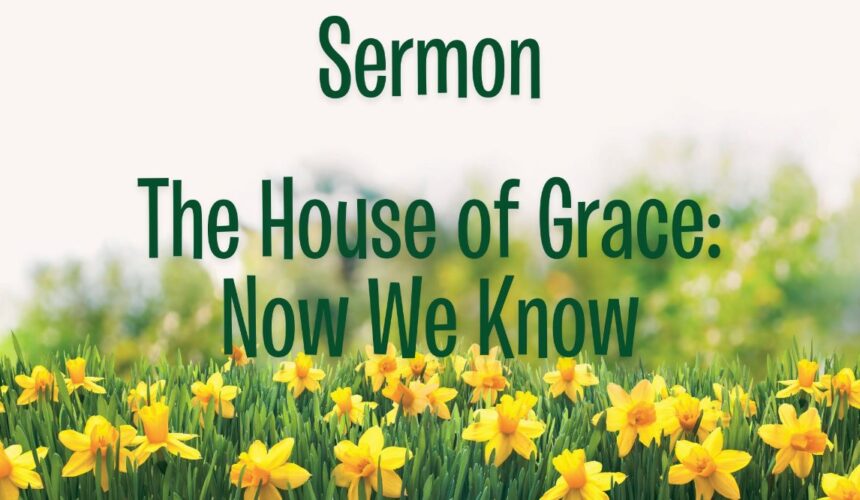The House of Grace: Now We Know
University Park United Methodist Church
14th Sunday in Ordinary Time
August 25, 2024
Scripture: Genesis 32:22 – 31
I love the scripture reading we heard this morning. It’s beautiful, mysterious, poetic, powerful. We started near the end of the story of Jacob, who’s been a liar and a con man his whole life. He’s traveling to meet his brother Esau, who he swindled years ago, and to whom he hasn’t spoken since. He’s terrified of how his brother may respond after all these years, and he has good reason to be. So the night before he meets his brother, he’s camped in the desert. He’s all alone. It’s late at night, centuries before electric lights and well lit cities, in a darkness lit only by stars. There Jacob is attacked by a mysterious stranger, and all night the two of them struggle, neither one willing to stop or surrender.
So who is Jacob fighting? The story isn’t clear. At first, it says a man attacks him. In the end, Jacob says he’s seen the face of God. Centuries after this story was first told, the prophet Hosea would say that Jacob was fighting an angel. Ancient Rabbis say he was having a vision, or struggling with himself or his conscience after all his years of scheming and hustling.
But let’s put Jacob aside for a moment. We’ll come back to him. Today is the second week in the series I’m calling “the house of grace,” exploring what I think is one of the central ideas of Christianity, this notion of grace.
The standard definition of grace is “the unmerited love of God.” But for me that doesn’t quite feel right. If we say that grace is God’s unmerited love, that sort of implies there’s such a thing as God’s merited love. But Grace has nothing to do with merit. Grace is completely unrelated to what we deserve or achieve. Grace is the notion that the one living and true God, the almighty creator of the universe, loves us not only more deeply than we imagine, but more deeply than we can imagine, for no reason except that’s just who God is. I think of grace as God’s character. Like I said last week, this is why the Biblical Book of First John says, “God is love, and whoever abides in love abides in God.”
John Wesley, one of the primary founders of Methodism, thought that grace functioned in different ways at different moments in our spiritual lives. So last week, I talked about what he called prevenient grace. Prevenient grace is the love of God that surrounds us and suffuses our lives before we know anything about God. Wesley didn’t invent that idea; it goes way back in Christian history. Augustine, the 4th and 5th century bishop and theologian, wrote about prevenient grace – and he got the idea from people who came before him. At the beginning of the Confessions, which is one of his two most famous books, Augustine wrote, “you have made us for yourself, O God, and our hearts are restless until we find our rest in you.” He’s talking about prevenient grace. Prevenient grace is why our hearts are restless until we find our rest in God. Prevenient grace is why human beings have the sense that there’s an important difference between right and wrong, and why we can often tell the two apart almost instinctively. Prevenient grace is the drawing in our heart that pulls us toward God before we’re even aware of being drawn.
Today, I want to talk about another aspect or function of grace that John Wesley also wrote about. He called it “justifying grace.”
In some Christian theology, justification is the word that’s used for the moment God forgives our sin. It’s when we are justified; when we sort of become OK with God. I don’t think that’s exactly wrong, but I like the way the Methodist Bishop Kenneth Carder describes it. In an essay Carder wrote, he says justification is the recognition that our identity and our worth are rooted in the God to whom we belong. Justification is the recognition of how God sees us and the commitment to live in light of that recognition: not because of anything we’ve done, but because that’s just the way God is. And when we recognize that, when we can truly take it on board emotionally and spiritually, that’s justification. It’s the acceptance of what God has been trying to give us all along.
Sometimes that experience comes at a single decisive moment. It did for John Wesley. Maybe you’ve read about this; it’s probably the most famous episode in his life. It’s often called his “Aldersgate Experience,” because he was in a place called Aldersgate when it happened. He went to this midweek gathering of Christians called a “religious society.” In those meetings, people prayed together; they sang hymns; they read and discussed scripture. And there, Wesley had an experience that changed his life. In his journal, he wrote,
“…while (the leader) was describing the change which God works in the heart through faith in Christ, I felt my heart strangely warmed. I felt I did trust in Christ, Christ alone for salvation. And an assurance was given me that he had taken away my sins, even mine and saved me from the law of sin and death.”
After a lifetime of striving, of trying to achieve, to accomplish, to earn his way; trying to do more and be better and measure up to the impossible standards he set for himself, Wesley suddenly realized he didn’t have to do any of that. In Carder’s words, he realized that his identity and his worth did not come from anything he had done or deserved, but rather from the love in which God held him. John Wesley had an experience of what he would later call justifying grace. Writing about this, Carder says, “Realizing our identity and worth as being rooted in the one to whom we belong is the essence of justifying grace. To accept that identity is to enter the doorway into a whole new existence. It is an identity we can never earn, nor can it ever be taken from us.”
Now maybe more often, justification is not a single decisive moment. Sometimes it’s a process. Back in 1990, I met an accomplished professional photojournalist, whose work was featured in newspapers and magazines. He grew up in a church, but his faith wasn’t a central part of his life until well into adulthood, when I guess the war and poverty and hardship he’d seen in his work brought him to reflect more seriously on questions of faith. He told me he was once asked when he was converted; what had been the key moment at which he made a decision for Christ. The question came from a woman whose version of Christianity held that a true faith was marked by that kind of powerful single moment. He told me he thought about it for a few seconds and then said, “Well, I was never really converted. I’m more in the process of being retrofitted.” Sometimes it’s like that. Sometimes grace slowly makes its impression on us over a period of years and then one day we realize we see the world differently.
So sometimes it happens all at once, and sometimes it comes a little at a time. But either way, in this world we’ve built for ourselves, this place we sometimes call “the real world,” of hard truths and hard knocks, grace is utterly improbable. The real world tells us in lots of different ways that we are not enough. The real world tells some of us not just that we have done something wrong but that we are something wrong. The real world gives us the message, in lots of different ways, that we have failed to measure up, that somehow we’re not paying the rent on our lives. We have to hustle. We have to earn. We have to justify ourselves.
Grace, though, tells us the opposite. Grace says there is no such thing as rent owed on our lives. There is no standard we have to achieve to be valued, or worthy, or loved. Those are gifts, given for no reason except that God wants us to have them. So maybe another way to describe justification is to say that justification is the state in which we live when we realize that God’s grace-filled world is the real world. God’s justifying grace wakes us up to what’s real. The grace that has been prevenient makes itself known and undeniable. And knowing it, we decide to commit ourselves to living in that light, knowing both that we are enough, and that God’s work will continue in us.
I said I’d get back to Jacob. In the story, Jacob has lived his whole life striving and trying to get ahead and wanting more. In his case, he’s done it by cheating and lying and conning people. So who is he fighting? Is it a passing man, or an angel, or God, or a vision or a dream or his conscience or himself? John Wesley’s brother Charles was another of Methodism’s primary founders, the poet and musician of the two. Charles had an answer I find beautiful. We sang it a few minutes ago, in a hymn he wrote based on this story. It’s called Come, O Thou Traveler Unknown. In that hymn, Jacob realizes that he is fighting against what he needs most. He’s never believed in grace. He’s fighting the God who is love, and in the last verse, he finally understands what he’s doing. Wesley wrote, “’Tis Love! Thou diedst for me. I hear Thy whisper in my heart. The morning breaks, the shadows flee: Pure, universal Love Thou art. To me, to all, Thy mercies move; Thy nature and Thy name is Love.”
I think Charles is writing about justifying grace, that moment or that process when we realize who God is and who we are to God. He’s writing about how grace can change even a shifty grifter like Jacob.
Like I said last Sunday, I’m doing something a little different in this series by closing each week with a few questions. I don’t need to know the answers, although I’d love to hear them if you want to share. So here are this week’s questions: Have you ever had one of those moments of grace, where you experienced God as love for you? What did that feel like? What was happening around you at the time? Or if it’s been more of a process for you, what have been some of the key steps along the way? What did those feel like, and what was happening at the time?
Let’s take a few moments of silence for reflection.


